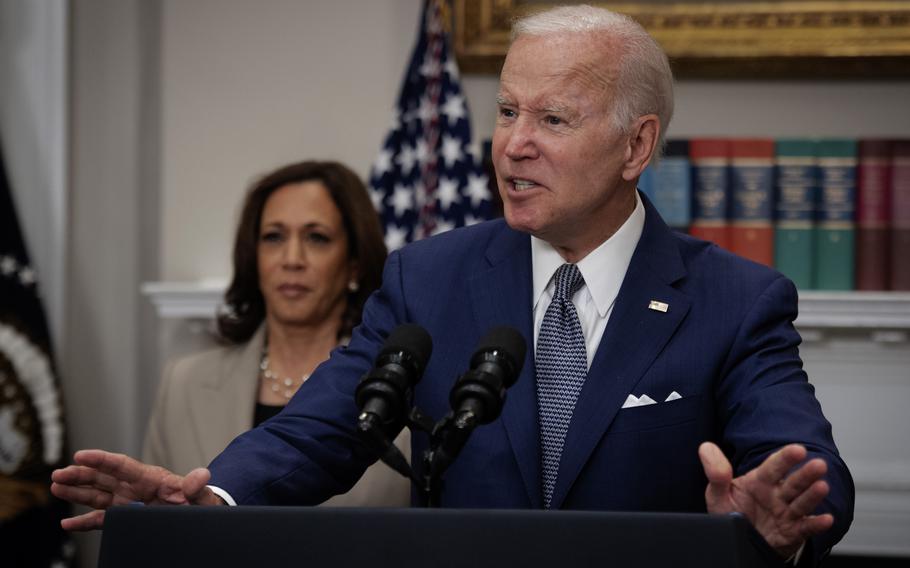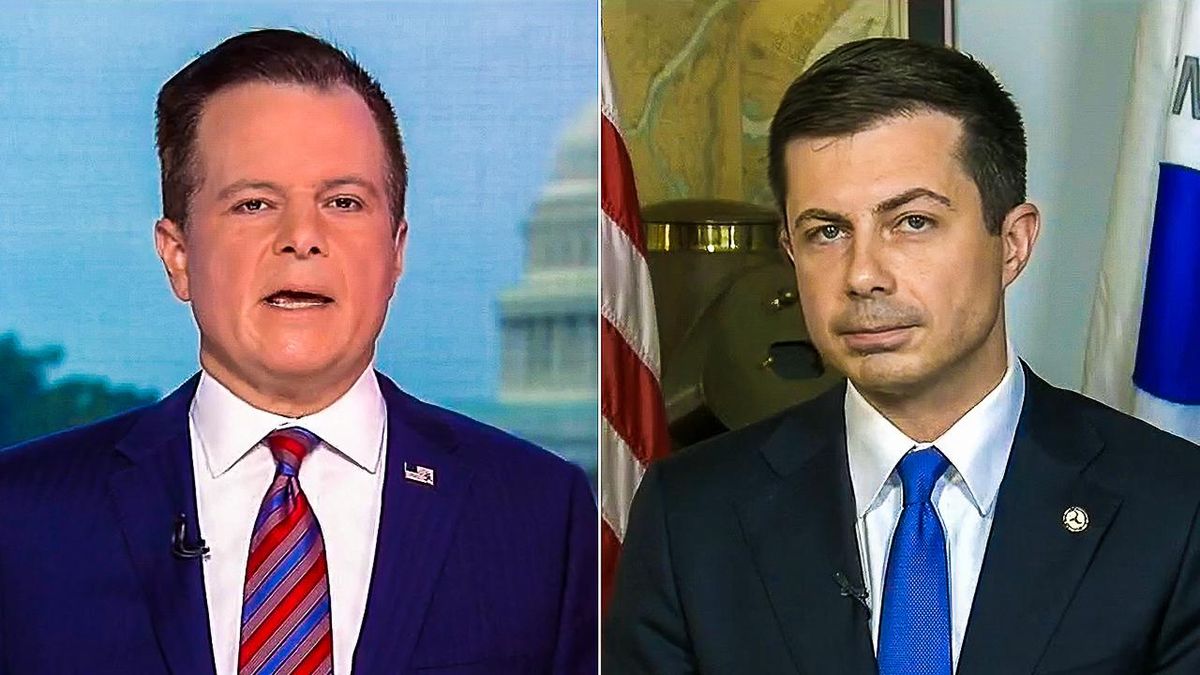‘They Painted a Narrative of This Coach Looking for a Quiet Corner to Pray’
 \
\
Janine Jackson interviewed Dave Zirin about the Supreme Court’s football prayer ruling for the July 1, 2022, episode of CounterSpin. This is a lightly edited transcript.

Coach Kennedy’s “private, personal prayer” (photo: Sotomayor dissent)
Janine Jackson: While we still reel from the theft of bodily autonomy from half the population, the right wing–dominated Supreme Court has delivered other blows to principles that many believed were assured.
In Kennedy v. Bremerton, a 6–3 ruling determined that Washington state high school assistant football coach Joseph Kennedy had a right to pray in the locker room and on the field. And why should a person be denied their right to what the Court described as a “short,” “personal,” “private” exercise of their religious beliefs?
As our guest and others want us to understand, the court’s ruling relies on a storyline that just doesn’t match the reality, and is much less about freedom than about coercion.
Dave Zirin is the sports editor at The Nation and host of the Edge of Sports podcast. He’s also author of numerous books about sports and their intersection with history, politics and social justice, including What’s My Name, Fool? Sports and Resistance in the United States, and, most recently, The Kaepernick Effect: Taking a Knee, Changing the World, which is out now from New Press.
He joins us now by phone from Takoma Park. Welcome back to CounterSpin, Dave Zirin.
Dave Zirin: Oh, it’s great to be here. Thanks so much for having me.

The Nation (6/27/22)
JJ: I can feel the heat coming off your piece on this. And I think it’s because of the boldly false premise of this ruling, about the role of coach prayer generally, but in particular about Kennedy. You say that this ruling is wrong from the opening statement. So maybe let’s start there.
DZ: Here’s the issue; it’s a cliche, but it’s true: You’re entitled to your own opinion, but you’re not entitled to your own facts. And in the decision that was written by Supreme Court Justice Gorsuch, he relied on his own facts. Let’s put it more simply: He lied in describing what took place in the case.
And here’s the thing: Coach Kennedy was not off, as Gorsuch writes, praying on his own. He was not off quietly doing this, and he was not fired for doing it. So they painted a narrative of this coach looking for a quiet corner to pray and then this school board, with pitchforks and torches in hand, forcing Kennedy out of his job.
None of this happened. What Kennedy did in praying in the locker room, and then particularly his prayers after the game on the field, was draw in players to surround him in prayer, asking players to do testimonials about God. All of this thing creates this kind of maelstrom of pressure on the players, that if you are down with your coach, you will pray with your coach. And if you’re not down with that, then, hey, you’re free not to pray with the coach, but anybody who’s ever played high school sports knows that if you don’t do what the coach says, particularly in an autocratic sport like football, you’re going to pay a price for that.
You’re going to pay a price for it, whether it’s in terms of playing time or, maybe even worse for the high school level, you’re going to pay a price for it in terms of being outcast, in terms of being seen as a locker room distraction, or even worse in the parlance of sports, a locker room cancer.
And that is what the Supreme Court basically said could now take place, is a process of bullying in high school sports to make players feel coerced into praying with their coach, and that’s unconscionable. It’s absolutely unconscionable. And I’ve gotten a lot of feedback from folks, including tons of stories about what it was like to play high school sports at private or religious institutions, and the degree of religious peer pressure that would take place, and how it would alienate, ostracize and all the rest of it.
And I should probably add that we would be completely, completely naive if we didn’t just see this as an issue of prayer, but this is about Christian prayer. Like if the coach was Jewish, Muslim, Hindu, whatever you want, Shinto, or wanted to do a prayer of atheism beforehand, there would be a very different response from this Court than Christianity, because this Court has shown itself to be proudly in a relationship with a kind of Christofascism which is quickly overcoming the ruling structures of the United States, if not the people themselves.

Seattle Times (6/29/22)
JJ: And just to underscore the idea of the false narrative, Danny Westneat in the Seattle Times, very close to the issue, wrote a story in which he was saying, as you have said, that Kennedy explained himself. He said he was inspired to start these midfield prayers after he saw an evangelical Christian movie called Facing the Giants, in which a losing team finds God, Christian God, and then goes on to win the state championship.
So the very idea that he was trying to find a personal private space to pray in private, and that he was being denied that, it’s just wholly not true.
DZ: And can I say something else? The school district—and I say this as somebody who made phone calls, spoke to people, I’m not just saying this for the purposes of my own narrative—they made every effort to try to accommodate Coach Kennedy. They made every effort to create spaces for him to pray.
And they did not fire him when he repeatedly and repeatedly ignored what they had to say, thumbed his nose at what they had to say. Look, my wife is a teacher, and if she thumbed her nose at the rules of the district to the degree that Coach Kennedy was doing, she would’ve found herself out of work.
Now, Coach Kennedy, again and again thumbing his nose at what they’re saying to him, and in the end, you know what they did, they didn’t fire him. They suspended him with pay, with the opportunity to reapply back for his job, and partly because I think they realized how hot button this was.

Dave Zirin: “There is a political movement in this country that’s playing for keeps. They don’t care how nice you’re going to be about it.”
They made every effort to try to look like partners in trying to figure this out. And they wanted to look like we want to collaborate with you to find a solution that actually helps and makes everybody feel validated.
And I think what they learned, which I think a lot of us need to learn, is that there is a political movement in this country that’s playing for keeps. They don’t care how nice you’re going to be about it. They don’t care if you’re willing to meet them halfway. They’re not trying for a bigger piece of the pie. They’re trying to take over the bakery right now.
And I think the sooner we realize that the better, because a lot of people in the ruling corridors of the Democratic Party really seem to have not gotten the memo.
JJ: It’s important that it integrates with sports and with athletics here, which I think makes it slot into a different place in some people’s brains. This ruling, it galls, of course, for many reasons, but part of it is the ability for people who have a public platform to express political or social concerns, whether they’re athletes or musicians or artists, it’s framed so differently depending on who they are and what they’re saying.
DZ: Exactly.
JJ: It’s related, but if I can just transition you, you’ve written about Muhammad Ali, about Colin Kaepernick. It’s always been true that there’s been a kind of policing of what people can say, if it’s decided that they’re outside of their purview.
DZ: Yeah. If I could say something about that, I wrote this book The Kaepernick Effect. I interviewed dozens of young people, a lot of them in high school, who took a knee, and they were invariably subject to all kinds of ostracization, pushed off the team, made to feel outcast from the team, oftentimes at the behest of the coach.
And I think one of the things that we need to come to grips with is that this kind of aggressive Supreme Court–led Christian posturing is political. Because people say, well, that’s just religious, what the coach is doing. Taking a knee during the anthem, that’s a political act, and politics have no place in sports.
Do you honestly think it’s not political that this coach is defying the school district time and again, is drawing in students into the prayer circle time and again, is thumbing his nose at the concerns of parents time and again, and now, and I wish I could bet money on this, is going to be on the right-wing gravy train probably for the next decade, doing speeches time and again, and maybe there’ll even be one of those Hollywood movies that only a small segment of the population sees, starring, I don’t know, Gina Carano and Kevin Sorbo, whatever, the actors who occupy that space.
And I think we need to realize that these onward Christian soldiers, like, that’s not just a song to them. This is a movement that they’re trying to build, and trying to collaborate and figure out common solutions I think is going to be a very, very difficult task, because their eye is not on reconciliation.

New York Times (6/30/22)
JJ: Right, right. Thank you for that. And I’m going to let you go, but while I have you, I can’t resist. Today’s New York Times:
More than four months after she was first detained, the WNBA star Brittney Griner is expected to appear in a Russian courtroom on Friday for the start of a trial on drug charges that legal experts said was all but certain to end in a conviction, despite the clamor in the United States for her release.
I know I’m asking a lot in a short amount of time, but I know that for a lot of listeners who follow media closely, they’re going to say, “Wait, there was a clamor in the United States for Brittney Griner’s release? Wait, who’s Brittney Griner?” Thoughts on that?
DZ: We need a much bigger clamor, is my first thought. Brittney Griner is a WNBA superstar. If her name was Tom Brady or Steph Curry, there would be a national day of action to try to get them freed from a Russian prison.
I mean, Brittney Griner is a political prisoner, make no mistake about it.
JJ: In Russia, in Russia—we care about Russia, right?
DZ: Yeah. Facing 10 years behind bars, five years at labor behind bars. I mean, this has nothing to do with drugs. I have serious doubts in the charges in the first place. This is about Ukraine. This is about political posturing. This is about this new cold war that we’re dealing with with Putin.
And this is about them trying to extract political prisoners out of the United States, who are Russian, in an exchange, and I think we need to apply pressure to our own State Department that bringing Brittney Griner home should be an immediate priority.
What’s disturbing is the concern that Brittney Griner, because she’s a woman athlete, because she’s from the LGBTQ community, because she presents in a certain way, that she’s just not getting the coverage or the attention that she otherwise would get.
And I think that’s one of the things also we need to fight against. It’s not just about injustice in Russia; it’s about standing up to injustice and prejudice here at home.
JJ: We’ve been speaking with Dave Zirin. He’s sports editor at The Nation, and you can follow his work at EdgeOfSports.com. Dave Zirin, thank you so much for joining us this week on CounterSpin.
DZ: Thanks for having me. I really appreciate it.





